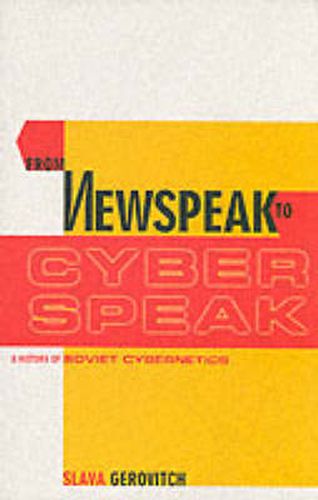Readings Newsletter
Become a Readings Member to make your shopping experience even easier.
Sign in or sign up for free!
You’re not far away from qualifying for FREE standard shipping within Australia
You’ve qualified for FREE standard shipping within Australia
The cart is loading…






In this book Slava Gerovitch argues that Soviet cybernetics was not just an intellectual trend but a social movement for radical reform in science and in society as a whole. Followers of cybernetics viewed computer simulation as a universal method of problem solving and the language of cybernetics as a language of objectivity and truth. With the new objectivity, they challenged the existing order of things in economics and politics as well as in science. Soviet cybernetics followed a curious arc. In the 1950s it was labelled a reactionary pseudo-science and a weapon of imperialist ideology. With the arrival of Khrushchev’s political thaw, however, it was seen as an innocent victim of political oppression, and it evolved into a movement for radical reform of Stalinist science. In the early 1960s it was hailed as science in the service of communism, but by the end of the decade it had turned into a shallow trend. Using extensive new archival materials, Gerovitch argues that these fluctuating attitudes reflected profound changes in scientific language and research methodology across disciplines, in power relations within the scientific community, and in the political role of scientists and engineers in Soviet society. His detailed analysis of scientific discourse shows how the Newspeak of the late Stalinist period and the Cyberspeak that challenged it eventually blended into CyberNewspeak.
$9.00 standard shipping within Australia
FREE standard shipping within Australia for orders over $100.00
Express & International shipping calculated at checkout
Stock availability can be subject to change without notice. We recommend calling the shop or contacting our online team to check availability of low stock items. Please see our Shopping Online page for more details.
In this book Slava Gerovitch argues that Soviet cybernetics was not just an intellectual trend but a social movement for radical reform in science and in society as a whole. Followers of cybernetics viewed computer simulation as a universal method of problem solving and the language of cybernetics as a language of objectivity and truth. With the new objectivity, they challenged the existing order of things in economics and politics as well as in science. Soviet cybernetics followed a curious arc. In the 1950s it was labelled a reactionary pseudo-science and a weapon of imperialist ideology. With the arrival of Khrushchev’s political thaw, however, it was seen as an innocent victim of political oppression, and it evolved into a movement for radical reform of Stalinist science. In the early 1960s it was hailed as science in the service of communism, but by the end of the decade it had turned into a shallow trend. Using extensive new archival materials, Gerovitch argues that these fluctuating attitudes reflected profound changes in scientific language and research methodology across disciplines, in power relations within the scientific community, and in the political role of scientists and engineers in Soviet society. His detailed analysis of scientific discourse shows how the Newspeak of the late Stalinist period and the Cyberspeak that challenged it eventually blended into CyberNewspeak.